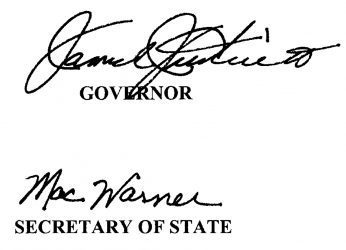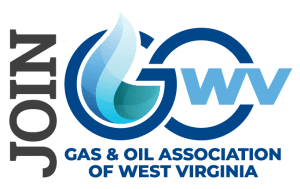STATE OF WEST VIRGINIA EXECUTIVE DEPARTMENT
At Charleston
EXECUTIVE ORDER NO. 40-20
By the Governor
WHEREAS, a State of Emergency was declared on the Sixteenth Day of March, Two Thousand Twenty for all counties in West Virginia (the “State of Emergency Declaration”), to allow agencies to coordinate and create necessary measures to prepare for and respond to the outbreak of respiratory disease caused by a novel coronavirus now known as COVID-19; and
WHEREAS, Chapter 15, Article 5, Section 6 of the Code of West Virginia authorizes the Governor to, among other things, control ingress and egress to and from a disaster area or an area where large-scale threat exists, the movement of persons within the area, and the occupancy of premises therein, and to perform and exercise other functions, powers, and duties that are necessary to promote and secure the safety and protection of the civilian population; and
WHEREAS, Executive Order 9-20 required all businesses and operations in West Virginia, except Essential Businesses and Operations as defined therein, to cease all activities within the state except for such minimum basic operations as are necessary to maintain the value of the business’s inventory, preserve the condition of the business’s physical plant and equipment, ensure security, process payroll and employee benefits, or related functions, and the minimum necessary activities to facilitate employees of the business being able to continue to work remotely from their residences, and provided exceptions for businesses such as home-based businesses and certain small businesses while requiring proper social distancing and hygiene practices be maintained at such businesses; and
WHEREAS, since the issuance of Executive Order 9-20 and other executive orders ordering closed or otherwise limiting occupancy of certain establishments and facilities in this state, implementation of successful public health measures has resulted in revised projections of rates of infection and COVID-19 related deaths in West Virginia, as well as ever-strengthening supply chains for personal protective equipment and other medical equipment and supplies, resulting in greater preparedness and response capacity throughout the state; and
WHEREAS, on April 27, 2020, I, Governor Jim Justice, announced the state’s reopening plan, West Virginia Strong: The Comeback (the “Comeback Plan”), to phase in the reopening of businesses in the state of West Virginia on a week by week basis to most effectively monitor and respond to the public health effects of this phased reopening, to be based upon certain metrics and conditions to safely reopen segments of West Virginia’s economy and get our citizens back to work, while ensuring the health and protection of all West Virginians, and especially the state’s significant elder and vulnerable population who are at most risk from the COVID-19 virus; and
WHEREAS, Executive Order 28-20 and Executive Order 30-20 allowed for the resumption of all medical procedures throughout the state while requiring that hospitals and ambulatory surgical centers around the state limit procedures to only more urgent procedures to ensure adequate response capacity and preserve necessary personal protective equipment and other resources at such facilities in the event of any surge ofCOVID-19; and
WHEREAS, under the Comeback Plan, Executive Order 32-20, Executive Order 36-20, Executive Order 37-20, and Executive Order 39-20 have been issued to transition the State to a safer-at-home policy and to allow certain types of businesses to begin to reopen or expand their operations, provided that certain safety measures are in place; and
WHEREAS, reopening additional segments of the state’s economy in accordance with the Comeback Plan, utilizing a phased approach to reopen sectors of the economy week by week, while continuing to prioritize and provide for the health and protection of all West Virginians, and especially the state’s significant elder and vulnerable population, is in the public interest; and
WHEREAS, West Virginia’s public health experts have advised that allowing for the reopening and/or expansion of certain types of businesses and activities in this state, including museums, zoos, and bars, and the reopening of state park lodges and cabins to in-state residents, is appropriate at this time; and
NOW, THEREFORE, I, JIM JUSTICE, pursuant to the authority vested in me pursuant to the provisions of Chapter 15, Article 5, Section 6 and Chapter 15, Article 5, Section 1 of the Code of West Virginia, hereby DECLARE and ORDER, effective as of 12:01 AM, Eastern Standard Time, on the Twenty-sixth day of May, Two Thousand Twenty, unless rescinded, amended, or otherwise postponed by subsequent executive order prior to the effective date of this Order, as follows:
- The following provisions of Executive Order 9-20, as previously amended by Executive Orders 32-20, 36-20, 37-20, and 39-20, are hereby further amended and supplemented as follows:
- Section 3, subsection (c) is hereby deleted in its entirety and replaced with the following to allow for on-premises consumption of food and/or drinks at bars, in addition to restaurants, provided that indoor seating occupancy must at this time be limited to 50% of such bar’s seating capacity:
“c. Food, beverage, and agriculture. Food and beverage manufacturing, production, processing, and cultivation, including farming, livestock, seed and feed stores, fishing, baking, and other production agriculture, including cultivation, marketing, production, and distribution of animals and goods for consumption, and businesses that provide food, shelter, and other necessities of life for animals, including animal shelters, rescues, shelters, kennels, and adoption facilities. Restaurants, bars, and other facilities that prepare and serve food and/or drinks, but only for limited on-premises consumption of food and/or drinks on such property as the restaurant, bar, or other facility owns or has a right to occupy or use, or for consumption off-premises, through such means as take-away, delivery, or drive through/drive in, in accordance with the applicable guidelines for restaurants, A Guide to Safely Opening our Restaurants Through Takeaway Service & Outdoor Dining and A Guid e to Safely Opening Restaurantsand Bars, both available at govemor.wv.gov, including a limitation on indoor seating occupancy of 50% of such restaurant’s, bar’s, or other facility’ s seating capacity. Schools and other entities that typically provide food services to students or members of the public may continue to do so under this Order on the condition that the food is provided to students or members of the public on a pick-up or take-away basis only. Schools and other entities that provide food services under this exemption shall not permit the food to be eaten at the site where it is provided, or at any other gathering site due to the virus’s propensity to physically impact surfaces and personal property.”
- Section 3 is hereby amended and supplemented by the addition of the following subsections to include museums and zoos as essential businesses:
“dd. Museums. Museums and similar businesses and facilities may resume operations, but must ensure that proper social distancing and hygiene practices are maintained. Additional guidance for such zoos, A Guide to Safely Reopening Museums and Visitor Centers, is available at governor.wv.gov.”
“ee. Zoos. Zoos and similar businesses and facilities may resume operations, but must ensure that proper social distancing and hygiene practices are maintained. Additional guidance for such zoos, A Guide to Safely Operating Zoos, is available at govemor.wv.gov.”
- Section 4, as amended, is hereby deleted in its entirety and replaced with the following to allow for museums, zoos, and bars to resume operations, provided that certain safeguards are in place:
“4. Prohibited activities. All places of public amusement, whether indoors or outdoors, including but not limited to locations with amusement rides, carnivals, arcades, fairs, pool halls, bingo halls, children’s play centers, playgrounds, bowling alleys, movie and other theaters (except for drive-in movie theaters which ensure that proper social distancing and hygiene practices are maintained, and operated in accordance with the Guidance for West Virginia Drive-In Movie Theaters, available at governor.wv.gov), concert and music halls, adult entertainment venues, racetracks (except where racetracks offer spectator-less horse races, beginning no sooner than May 14, 2020, which shall not allow any in-person spectators but which horse races may be simulcast, provided that such horse racing shall be conducted m accordance with guidance and best practices developed, published, and disseminated by the applicable track operators and horsemen’s associations, including ensuring all staff and employees maintain proper social distancing and hygiene practices; and except for outdoor motorsport or powersport racetracks or venues, which shall not allow any in-person spectators but which may allow for operation in accordance with the guidance, A Guide to Safely Reopening Outdoor Motorsport and Powersport Racing, available at govemor.wv.gov), and other similar businesses shall be closed; provided, however, that the following specific outdoor recreational businesses and activities may resume operations as follows:
- The Hatfield McCoy Trail System may reopen in accordance with the guidance, A Guide to Safely Opening & Operating the Hatfield McCoy Trail System, available at wv.gov;
- Outdoor recreation outfitters may reopen in accordance with the guidance, A Guide to Safely Reopening Outdoor Recreation Outfitters, available at wv.gov;
- Whitewater rafting businesses may resume operations m accordance with the guidance, A Guide to Safely Reopening Whitewater Rafting, available at governor.wv.gov; and
- Ziplining businesses may resume operations in accordance with the guidance, A Guide to Safely Reopening Zipline Outfitters, available at wv.gov.”
- Executive Order 2-20, as previously amended by Executive Order 32-20 and Executive Order 39-20, as it relates to the prohibition against on-premises consumption of food or drink or occupancy by the general public at bars for purposes other than picking up food and/or drink from such establishment to be taken away, is hereby amended to provide that all restaurants, bars, and other facilities that prepare and serve food and/or drinks may operate, but only for limited on-premises consumption of food and/or drinks on such property as the restaurant, bar, or other facility owns or has a right to occupy or use, or for consumption off-premises, through such means as take-away, delivery, or drive-through/drive in, in accordance with the applicable guidelines for restaurants and bars, A Guide to Safely Opening our Restaurants Through Takeaway Service & Outdoor Dining and A Guide to Safely Opening Restaurants and Bars, both available at govemor.wv.gov, including a limitation on indoor seating occupancy of 50% of such restaurant’s, bar’s, or other facility’s seating capacity.
- State park lodges and cabins may reopen to residents of the state of West Virginia, provided, however, that all state park lodges and cabins shall remain closed to any new arrivals to such state park lodge or cabin who have traveled from outside of West Virginia, provided that this prohibition against out of state arrivals at state park lodges or cabins shall not apply to any individuals involved in commercial activity, including without limitation individuals involved in commercial trucking activities and individuals who commute into or out of the state for work, persons performing any emergency, health, military, or infrastructure response activities necessitating lodging in the state, or persons otherwise engaged in and who must remain in or travel into the state for the purposes of conducting Essential Businesses and Operations under the terms of Executive Order 9-20, as amended.
IN WITNESS WHEREOF, I have hereunto set my hand and caused the Great Seal of the State of West Virginia to be affixed.
DONE at the Capitol in the City of Charleston, State of West Virginia, this Twenty-second day of May, in the year of our Lord, Two Thousand Twenty in the One Hundred Fifty-seventh year of the State.



